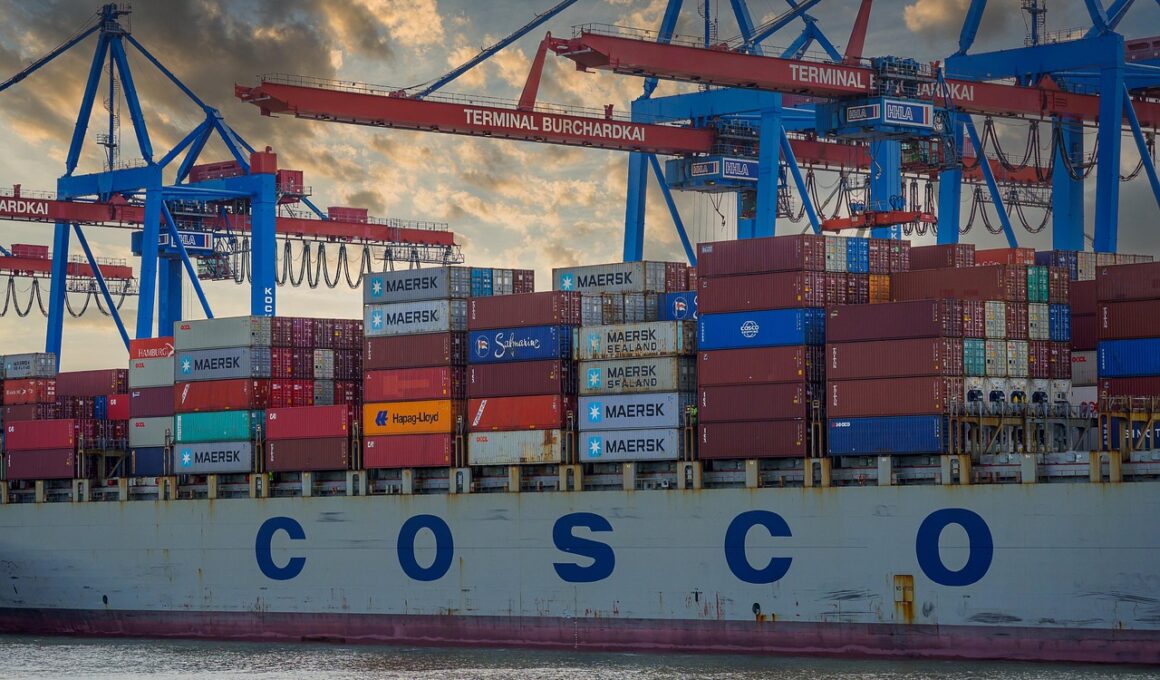Supply Chain Finance: Optimizing Cash Flow in International Trade
Supply chain finance (SCF) plays a vital role in optimizing cash flow for businesses engaged in international trade. This financial practice helps facilitate transactions between buyers and suppliers, ensuring smooth and timely payments while enhancing liquidity across the supply chain. By utilizing SCF solutions, organizations can minimize financing costs and improve working capital, ultimately driving efficiency in their operations. Importantly, SCF addresses the inherent complexities of cross-border trade, such as currency fluctuations and varying regulations across jurisdictions, which can complicate financing for international transactions. Additionally, SCF leverages technology to streamline the process, using platforms that integrate data from trading partners to generate real-time insights into cash flow dynamics. Ultimately, SCF is beneficial for both buyers and suppliers since it mitigates payment risks and creates a mutually beneficial environment. As a result, more companies are looking to implement SCF strategies to stay competitive in today’s global marketplace. The innovative tools available not only improve liquidity but also foster stronger relationships between all parties in the supply chain, ensuring a collaborative approach to financing international trade.
Implementing SCF strategies requires understanding the various components and how they interact within the framework of international trade. Key elements of SCF include financing options such as reverse factoring, dynamic discounting, and inventory financing, which can be customized according to a company’s specific needs. Reverse factoring allows suppliers to receive payments from a buyer’s financial institution after the buyer approves the invoice, effectively allowing suppliers to access cash sooner. Meanwhile, dynamic discounting offers early payment discounts to buyers, enabling them to save costs while suppliers maintain reliable cash flow. Inventory financing, on the other hand, allows businesses to secure loans against their stocked inventory, providing quick capital access without unduly affecting their working capital. To effectively utilize SCF, organizations need to collaborate with financial institutions to create tailored solutions that fit their operational model. Furthermore, the integration of SCF platforms must align with existing supply chain management systems to ensure seamless interaction between all stakeholders and data sources. This holistic approach can lead companies toward sustainable growth in an increasingly competitive global marketplace.
Benefits of Supply Chain Finance
The benefits of supply chain finance extend beyond mere cash flow optimization. One of the primary advantages includes reducing the overall cost of goods sold (COGS), as SCF enables suppliers to lower their prices due to enhanced liquidity and reduced financing costs. Furthermore, with improved payment terms, buyers can negotiate better deals with suppliers, ultimately leading to increased competitiveness in the market. Another significant benefit is the enhancement of supplier relationships, as timely payments create trust and confidence in the buyer-supplier dynamic. This can lead to improved quality of goods and services, as suppliers are more likely to prioritize the needs of reliable partners. Additionally, SCF fosters transparency throughout the supply chain, which helps mitigate potential risks and identifies bottlenecks ahead of time. By having real-time data on cash flow and payment cycles, organizations can make informed decisions regarding inventory management, production schedules, and supplier selection. Overall, SCF plays a critical role in streamlining operations and enhancing the strategic positioning of companies involved in international trade.
An essential aspect of successfully implementing supply chain finance is leveraging technology. Modern tech platforms facilitate automated processes and provide analytics that enable real-time monitoring of cash flow cycles. These platforms are designed to capture relevant data from various stakeholders, offering insights that can help identify potential opportunities and challenges. Organizations can utilize such data to make informed decisions regarding payment terms, inventory levels, and supplier performance. Furthermore, technological advancements have led to the increasing adoption of blockchain technology in SCF, enhancing transparency and security in transactions. With blockchain, businesses can ensure that payment outcomes are reliable while also minimizing the potential for fraud or disputes. In a landscape where digital capabilities are transforming traditional processes, businesses that adopt SCF technology can also expect to achieve higher operational efficiency. This empowers finance teams to focus on strategic initiatives and develop innovative financial solutions that align with overall business objectives. As a result, companies not only optimize cash flow but also improve their competitive edge in the dynamic international trading environment.
Challenges in Supply Chain Finance
Despite the numerous advantages, there are also challenges associated with implementing supply chain finance solutions. One of the most significant challenges lies within the complexity of globalization, where companies face fluctuations in currency rates and various regulatory requirements across regions. This can lead to higher operational risks and financial uncertainties, potentially impacting the overall efficiency of SCF. Additionally, some businesses may face resistance to change from internal teams who are accustomed to traditional financing methods. This cultural shift requires robust change management processes to help employees adapt to new strategies. Moreover, integration intricacies arise when implementing SCF solutions, primarily due to the need for compatibility with existing systems and data sources. Businesses may need to invest in training and system upgrades to ensure proper adoption and leverage the full potential of SCF. As firms navigate these challenges, clear communication and strong relationships with financial institutions are vital for overcoming obstacles and fostering a successful SCF practice. By addressing these issues, organizations can unlock the full benefits of supply chain finance and enhance their trading capabilities.
Regulatory compliance is another critical aspect that companies must prioritize when implementing supply chain finance strategies. Financial regulations vary significantly from one country to another, and businesses must navigate these diverse requirements to avoid potential legal pitfalls. Non-compliance can lead to substantial fines, reputational damage, and operational disruptions that can hinder international trade activities. Therefore, organizations engaging in SCF should work closely with legal and compliance teams to understand jurisdiction-specific regulations governing trade finance. This collaboration is essential in mitigating regulatory risks, ensuring that all processes adhere to legal standards. Furthermore, development of comprehensive compliance programs that incorporate training for employees on regulations can help cultivate a culture of accountability and diligence within the organization. By fostering an understanding of regulatory requirements, companies can more effectively manage their trade finance risk, which subsequently enhances their performance in the global marketplace. Ultimately, prioritizing compliance not only protects against negative consequences but also contributes to long-term success and sustainability within the international trading landscape.
Conclusion and Future Prospects
In conclusion, supply chain finance serves as an essential instrument for businesses looking to optimize cash flow and navigate the complexities of international trade. By implementing effective SCF strategies, companies can enhance their financial performance, improve supplier relationships, and achieve a competitive edge in the market. As technology continues to evolve, the future of SCF will likely witness even greater advancements that will further streamline processes and strengthen financial ties within the supply chain. The adoption of artificial intelligence, machine learning, and blockchain technology will redefine the way firms approach trade finance, providing real-time analytics and enhanced security. In addition, because the global business landscape is continually changing, firms must remain adaptable and responsive to emerging trends that may impact their trading capabilities. By maintaining a proactive approach and staying informed of technological advancements and regulatory frameworks, firms can successfully evolve their SCF practices to meet the increasing demands of international trade. Ultimately, the successful optimization of cash flow through SCF enables organizations to thrive while contributing positively to the global economy.
By recognizing the value of supply chain finance, businesses can unlock potential growth opportunities while navigating the challenges of international trade. Strong focus on collaboration, technology, and compliance will be crucial in maximizing the benefits of SCF and establishing a resilient supply chain. As firms engage with SCF practice, the collective impact will be transformative — fostering innovation and higher efficiency in global commerce. With ongoing commitment to enhancing SCF capabilities, organizations can look forward to a future where cash flow optimization not only becomes a competitive advantage but also encourages sustainable business practices worldwide.


